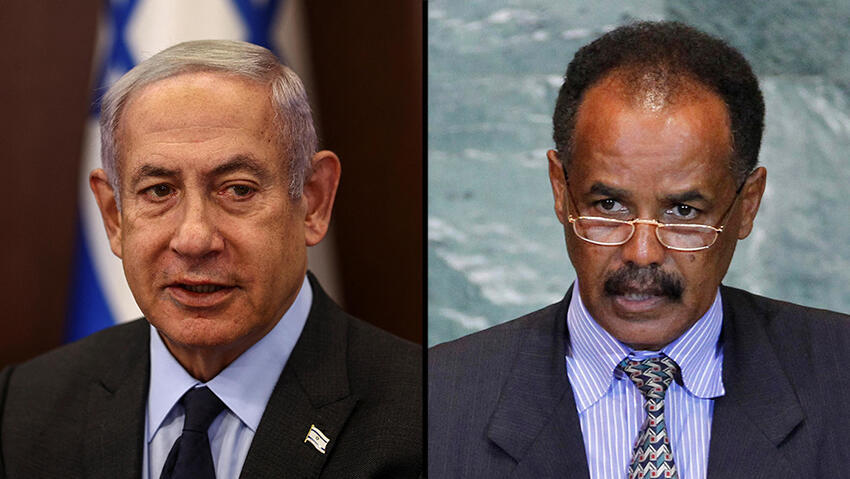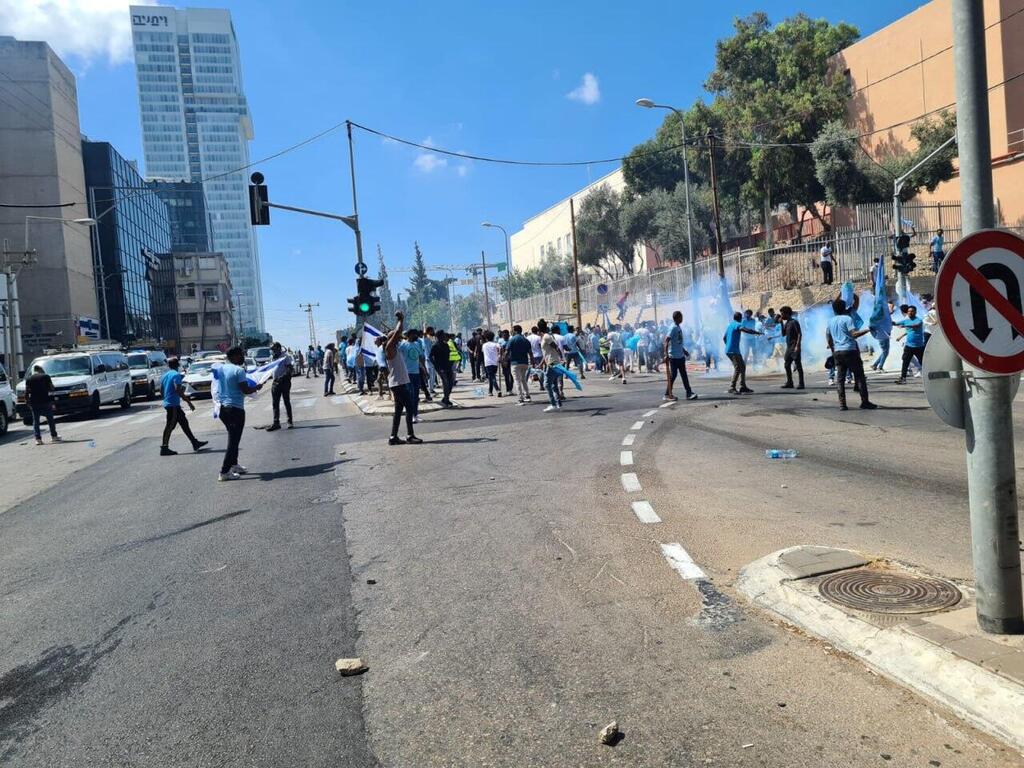The relationship between Israel and the government of Eritrea, often referred to as the "Africa's North Korea," has been strained for a while now. Israel has not authorized the appointment of an ambassador to Asmara, Eritrea's capital, and the Israeli embassy building has been left deserted since 2020. Eritrea consistently votes against Israel in international forums, including the United Nations, and was a vocal opponent against Israel's reinstatement as an observer in the African Union.
Read more:
With this information in mind, one might be tempted to ask why Israel did not disengage all official diplomatic relations with Eritrea. One of the most common explanations to this conundrum is Israel's security interests in the Horn of Africa, a region that constitutes a strategic geographical location. If foreign sources are to be believed, Israel maintains intelligence bases and Navy submarines in and around that area.
2 View gallery


Prime Minister Netanyahu and President Afwerki
(Photo: AP, Reuters/Ronen Zvulun/Pool)
The Israeli embassy in Asmara was left deserted in April of 2020. Fast forward seven months later, the Eritrean Army took up arms along with the Ethiopian Armed Forces in a war against the Tigray's People Liberation Front. Together they were accused of committing war crimes against locals, and the United States responded by imposing sanctions on notable Eritrean officials, including their armed forces chief of staff.
Eritrea and Ethiopia have been conducting armed guerilla warfare for over three decades, and it's only back in 1991 that Eritrea finally announced its independence, thus becoming a dictatorship. Most asylum seekers from Eritrea currently residing in Israel arrived between 2006 and 2011, with four-out-of-every-five of them men.
After spending many years in Israel, most of them speak Hebrew. During its zenith, the Eritrean wave of immigration brought about 50,000 individuals, with 17,000 of them still currently in the Holy Land. The vast majority of those still in Israel are fierce opponents of the theocratic regime they escaped from back home. During the last year, over 2,000 Eritreans have left Israel. Some went back home, while others joined their families in Canada, the United States and several other nations. On a monthly basis, around 300 to 500 Eritreans leave Israel willingly.
Eritreans protesting in Tel Aviv
(Video: Adam Kutub, Nadav Avas)
The Eritrean Embassy in Israel has been around since 2004. Lacking an official ambassador, the embassy is currently run by a designated custodian. It filed an official request to hold a cultural festival that, among other things, would help raise funds for the Eritrean regime, and asked Israeli officials to provide protection for the festival, fearing asylum-seeker reprisal.
Those who object to the regime, who have escaped Eritrea, decided to protest against opening such a festival, culminating in the intense violent clashes seen in Tel Aviv on Saturday. Rioters used clubs, hurled stones and used knives to inflict serious injuries on at least 135 people, including police officers, leading to at least 39 of them being placed under arrest.
It appears Israeli authorities severely misjudged the tensions running between the opposing camps, and were ill-equipped to handle these violent clashes. Police separated the sides and worked to halt the violent uprising that spun completely out of control. People who assist Eritreans living in Israel say that, with all due respect to those who object to the regime back home, their behavior was abhorrent and completely disrespectful to the country that gave them shelter.
An Israeli official that works with the Eritrean community said that the violence is unacceptable and completely inappropriate, and added that he finds the issue very disconcerting.
Israel is not alone ,however. These sort of cultural festivals, held to praise the regime of President Isaias Afwerki, have been held in several other countries that have large Eritrean communities, resulting in similar violent clashes and confrontations between those who object to the regime and those who support it.
Canada, Germany and Sweden have witnessed similar clashes. In Toronto, for example, authorities canceled the festival due to fear of rioting. Afwerki's detractors here in Israel claim his supporters are regime spies that keep him apprised of every step protesters make. They claim the Eritrean regime persecutes their families, conducts a policy of intimidation and keeps them hostage.
ERITREAN PROTESTS
(ILTV)





